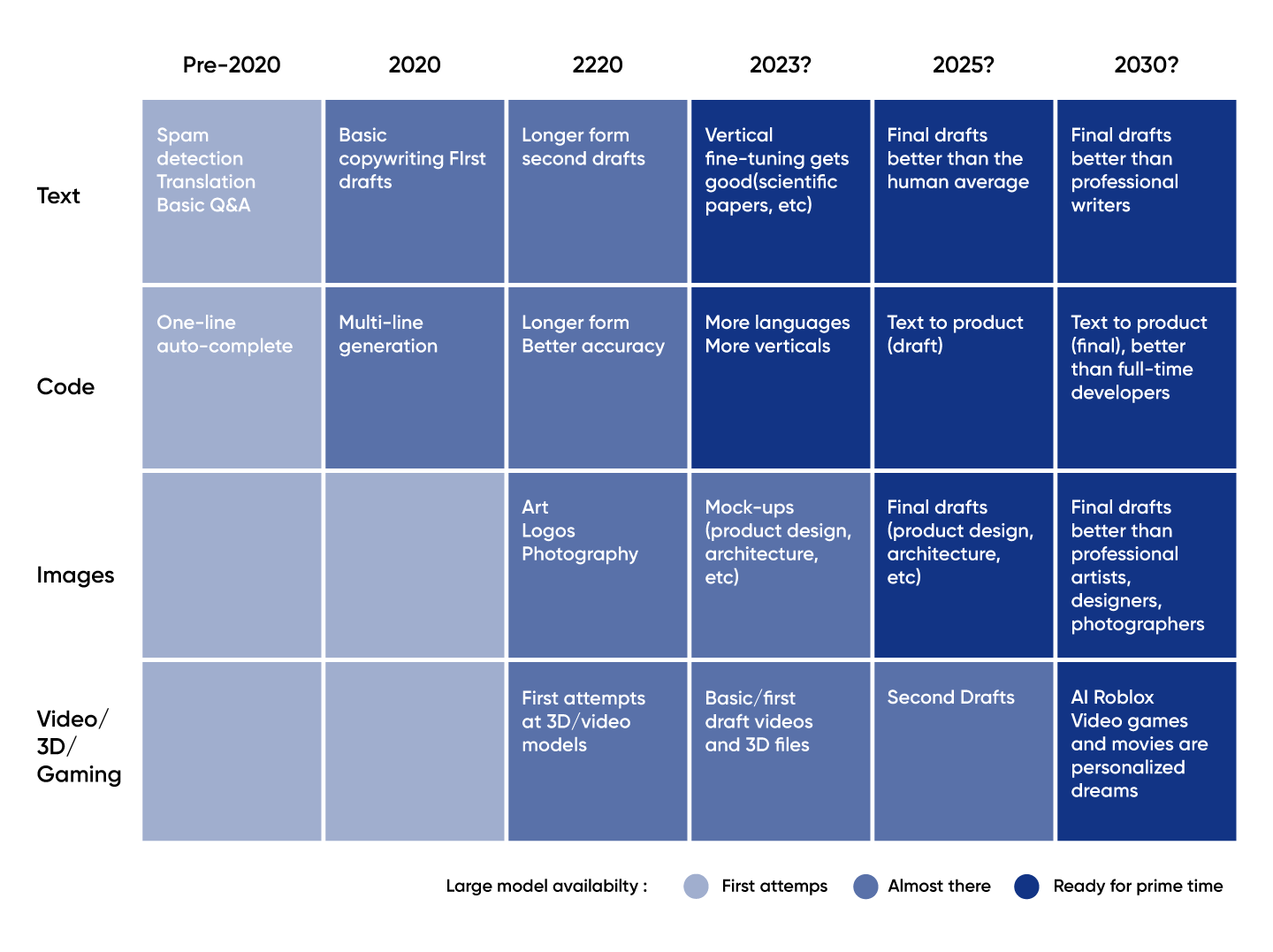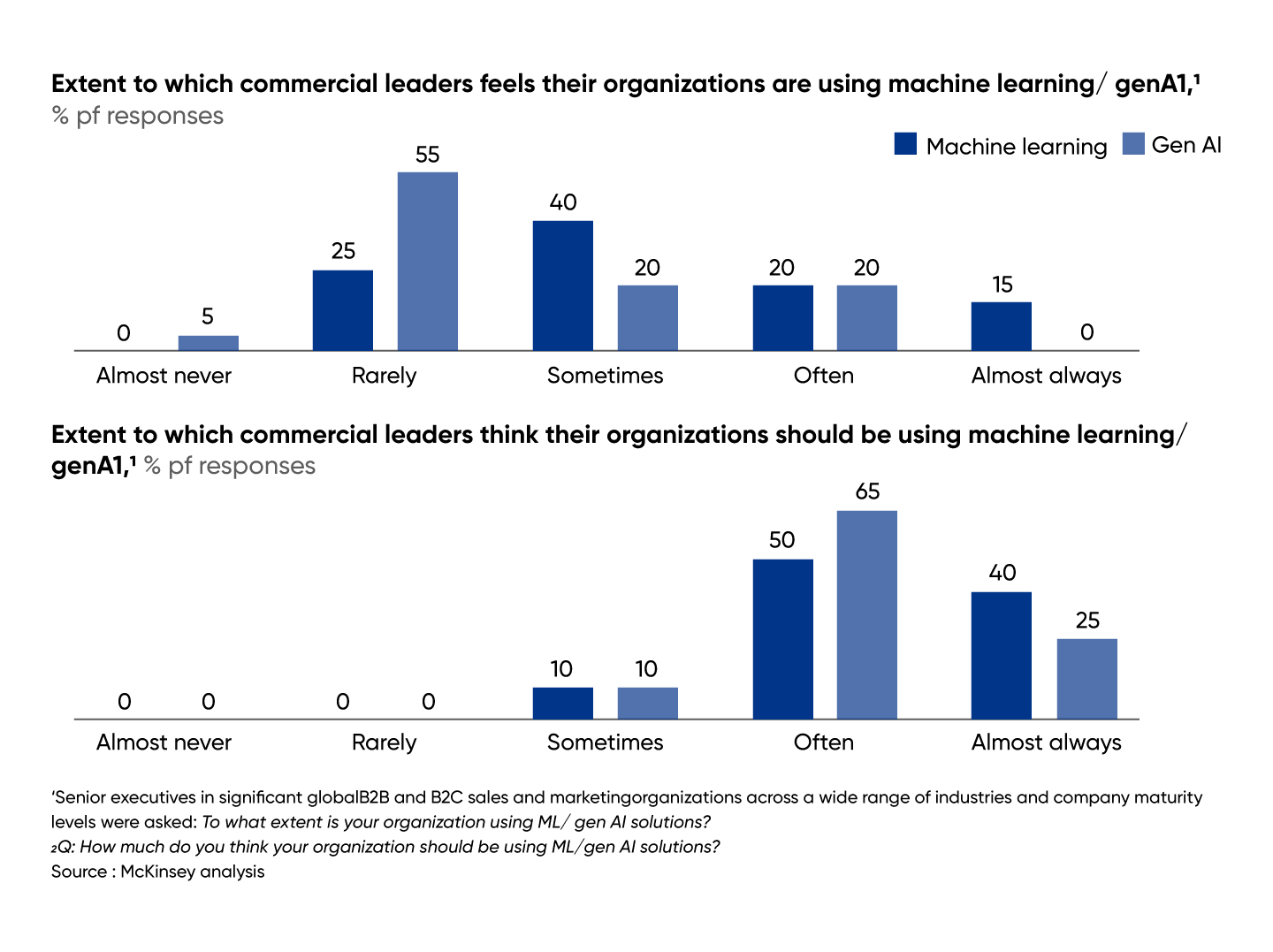
Subscribe
Be the first to know about our latest posts.
Ready to explore our services?
Revolutionizing Content and Personalization: Unleashing the Power of Generative AI
In the era of advanced technology, the significance of content and personalization cannot be overstated when it comes to engaging and maintaining audience interest. The sheer volume of information available poses a significant challenge for content creators, marketers, and businesses aiming to engage with their target audience effectively. With the emergence of Generative Artificial Intelligence (AI), a groundbreaking tool has arrived, fundamentally transforming the way we generate content and tailor experiences.
This blog explores the potential of Generative AI in transforming the future of content creation and personalization.
The Rise of Generative AI
Generative AI encompasses a category of algorithms and models that empower machines to autonomously create and generate content. These AI systems are trained on vast amounts of data, allowing them to mimic human creativity and produce high-quality content across various mediums, including text, images, and even videos.
Moreover, these models have developed the capability to recognize shapes and patterns from images such as the silhouettes of dogs, snakes, kids, and shirts. The rapid advancements in machine learning and deep learning techniques have significantly propelled the development and adoption of Generative AI.
The ongoing advancement of Generative AI is already making a significant impact across diverse industries. According to a report by MarketsandMarkets, the global Generative AI Market size is anticipated to grow from USD 11.3 billion in 2023 to USD 51.8 billion by 2028, a CAGR of 35.6% during the forecast period. This statistic highlights the growing recognition of the transformative potential of Generative AI in content creation and personalization.
The Game-changing Role of Generative AI in Transforming Content & Personalization
Generative AI tools offer immense versatility for content creation and personalization, benefiting various industries and formats with their diverse capabilities. In fact, by 2030, generative AI is anticipated to significantly enhance its output in various niches, including text, code, images, and video, surpassing the capabilities of human workers.
This advancement is enabling businesses to increase their content production at a rapid pace and on a larger scale, leading to improved productivity and profitability.
Talking further, the emergence of generative AI has the potential to foster innovation and open avenues for new business models and applications. While platforms like ChatGPT are trained on diverse data, we can anticipate the development of specialized generative AI systems tailored for specific industries and datasets, such as market intelligence or medical research.
Here’re some of the most common ways Generative AI brings about the transformation.
Enhancing Content Creation
Generative AI holds tremendous potential for enhancing content creation processes. By analyzing and learning from voluminous content available on the Internet, AI models can generate highly relevant and engaging content tailored to specific audiences.
For instance, OpenAI's language model GPT-4 has showcased remarkable abilities in producing coherent and contextually appropriate text. According to OpenAI, GPT-4 can answer questions, create conversational agents, generate code, and even draft articles with minimal human intervention. Other aspects of content creation that Generative AI can enhance are Q&A and image generation.
Revolutionizing Q&A
The potential of Generative AI to revolutionize question-and-answer systems is immense, fundamentally transforming the way we seek and provide information. By training on vast amounts of textual data, AI models can understand and generate relevant responses to user queries, enabling efficient and accurate information retrieval. Generative AI-powered chatbots and virtual assistants can engage in meaningful conversations, answer common user queries, and offer personalized recommendations. This technology holds immense potential in customer support, education, and other domains where quick and accurate responses are crucial. As generative AI continues to advance, it can learn from user interactions and refine its answers, creating more natural and context-aware responses.
Generating Images from Texts
One of the most captivating applications of generative AI is its ability to generate images based on textual descriptions, prompts, or even blog posts. Through techniques such as conditional image generation, AI models can translate written descriptions into vivid and life like visual representations.
This technology opens new possibilities for content creation, storytelling, and creative expression. Content creators can provide textual prompts to generative AI models and, in turn, receive visually appealing images that match their vision.
Furthermore, generative AI can assist in automating the process of creating visuals for articles, advertisements, and various other forms of media. This saves time and ensures a more consistent visual representation aligned with the desired content.
Personalizing User Experiences
Personalization has emerged as a fundamental pillar of digital experiences, playing a pivotal role in their success. Generative AI empowers businesses to deliver personalized content and experiences to their users at scale. Through user data analysis, AI models have the capability to generate customized recommendations, personalized content, and user-specific advertisements. This leads to enhanced user engagement and satisfaction, resulting in higher conversion rates. Through the utilization of AI-powered personalization, businesses can deliver customized experiences that deeply resonate with individual users, forging stronger connections and unlocking maximum conversion potential.
Generative AI can analyze user behavior, historical data, and contextual information to anticipate user needs and deliver personalized experiences in real time. According to research conducted by Epsilon, it was discovered that when brands provide personalized experiences, a staggering 80% of consumers exhibit a higher likelihood of making a purchase. Generative AI enables businesses to meet these expectations and deliver customized content that resonates with individual users.
Creating Engaging Marketing Content
Marketing is a domain where Generative AI can have a profound impact. Marketers constantly strive to create compelling and attention-grabbing content to promote their products or services. Generative AI tools can help automate content creation by generating marketing copy, social media posts, and advertising materials.
In the next two years, marketing leaders anticipate significant utilization of generative AI solutions, with over 90% expressing their expectation to utilize these solutions frequently. which underlines the potential of Generative AI in transforming marketing practices. - McKinsey
According to the research findings, businesses that allocate resources towards AI implementation are experiencing a notable increase in revenue ranging from 3 to 15 percent. Furthermore, these companies are also witnessing a significant return on investment (ROI) in terms of sales, with an uplift of 10 to 20 percent. The data clearly demonstrates the positive impact of investing in AI technologies, highlighting the potential for substantial financial gains and improved business performance.
Streamlining Content Localization
In today's globalized world, businesses often need to localize their content to cater to different markets and languages. Generative AI can simplify and accelerate the content localization process. By leveraging AI models, businesses can automatically generate localized versions of their content, reducing the time and effort required for manual translation. This enables businesses to scale their content localization efforts and reach a broader audience more efficiently.
Transforming Translation
The advancements in generative AI have revolutionized the translation landscape, surpassing numerous language barriers. Through the utilization of extensive language models, it can effortlessly and accurately translate text from one language to another.
This technology not only enables seamless communication across different languages but also enhances localization efforts for businesses expanding into global markets. By automating translation tasks, generative AI saves time and resources, allowing human translators to focus on more complex and nuanced language tasks.
Additionally, generative AI can learn from human feedback, constantly improving its translation capabilities and adapting to specific contexts and styles.
Overcoming Creative Blocks
Content creators frequently face creative blocks, struggling to generate fresh ideas or overcome writer's block. Generative AI tools can serve as valuable aids, inspiring creativity and providing novel perspectives. By leveraging AI-generated content prompts, creators can find new angles, explore uncharted territories, and push the boundaries of their creative endeavours. This fusion of human creativity and AI assistance opens exciting possibilities for content creation.
Note: Ethical Considerations
While Generative AI offers transformative possibilities, it also brings forth ethical considerations. AI-generated content can potentially spread misinformation or be used for malicious purposes. Hence, it becomes crucial to establish guidelines and frameworks to ensure responsible use of Generative AI. Companies and developers must prioritize transparency, accountability, and user consent in the deployment of AI-generated content.
Conclusion
Generative AI is poised to revolutionize the future of content creation and personalization. Its ability to generate high-quality content, personalize user experiences, streamline localization efforts, and overcome creative blocks makes it a powerful tool for content creators, marketers, and businesses. However, harnessing the power of Generative AI also comes with a responsibility to address ethical considerations. The potential for AI-generated content to spread misinformation or deceive users requires a proactive approach to ensure ethical use. OpenAI, for example, has taken steps to promote responsible AI use by limiting access to their powerful language models and introducing safeguards to prevent misuse.
To fully unlock the potential of Generative AI, businesses and content creators should embrace a collaborative approach, combining the strengths of human creativity and AI assistance. Instead of being viewed as a replacement for humans, AI should be regarded as a valuable tool that supplements and amplifies human capabilities. By leveraging AI-generated content as inspiration and guidance, content creators can push the boundaries of their creativity and deliver more engaging and personalized experiences. Explore Icreon’s personalized experience services to drive value across different phases of your operational and marketing funnels.



